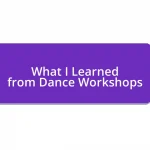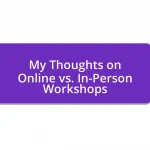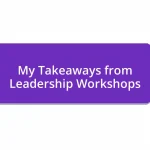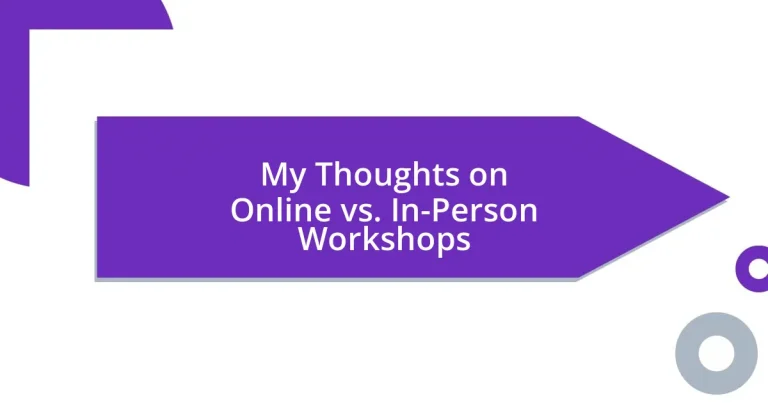Key takeaways:
- In-person workshops foster dynamic interactions and immediate feedback, enhancing motivation and learning through shared experiences.
- Online workshops offer accessibility and flexibility, allowing diverse perspectives to enrich discussions and making them more convenient for participants.
- Choosing between formats depends on individual learning styles, networking preferences, and comfort with technology.
- Engagement techniques like asking questions and facilitating small group discussions boost participation and deepen understanding in both settings.
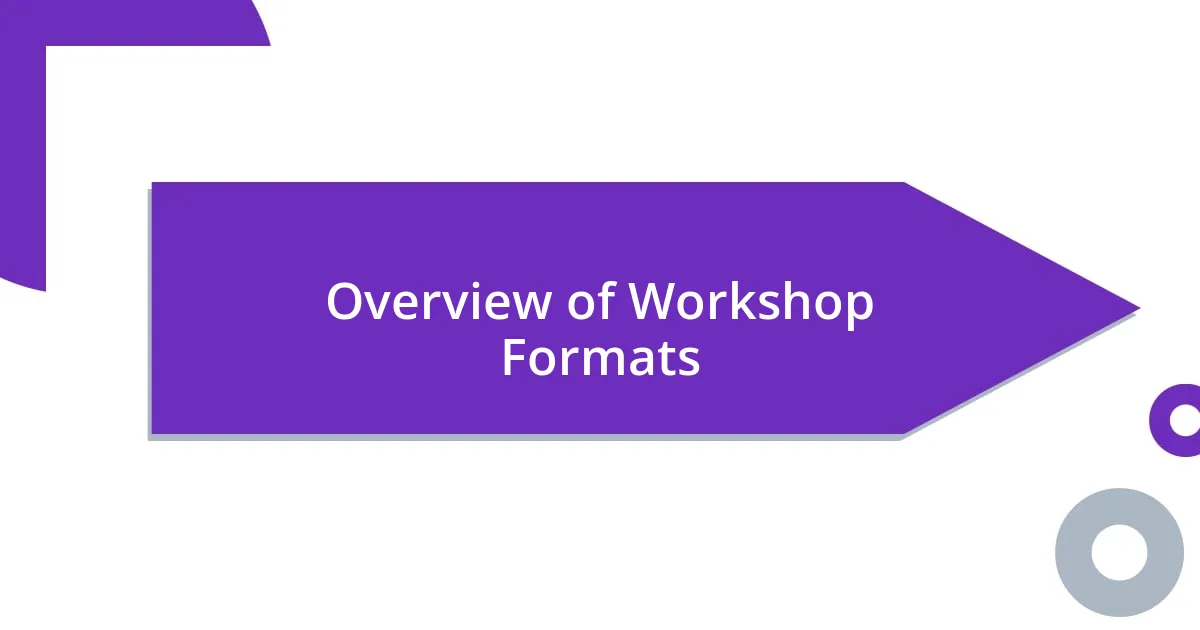
Overview of Workshop Formats
Workshops come in a couple of primary formats: online and in-person. Each format has its unique charm and challenges, shaping the overall experience. For example, I still remember my first online workshop – I was initially skeptical about learning effectively through a screen, yet it opened my eyes to a whole new world of accessibility and flexibility.
In-person workshops foster a certain energy that’s often hard to replicate online. The spontaneous conversations, the laughter, and the palpable enthusiasm in the room are irreplaceable. I recall a particularly engaging in-person workshop where the group dynamics turned a simple discussion into a fascinating brainstorming session – it felt electric! Can an online environment truly capture such serendipity? It’s a question worth pondering.
On the other hand, online workshops can be incredibly inclusive, allowing people from all corners of the world to connect. I’ve attended sessions where participants shared rich cultural perspectives that I would have never encountered otherwise. Isn’t it fascinating how technology can bridge gaps and bring together diverse voices? Each format carries its distinct flavor, ultimately influencing how we learn and interact with the material.
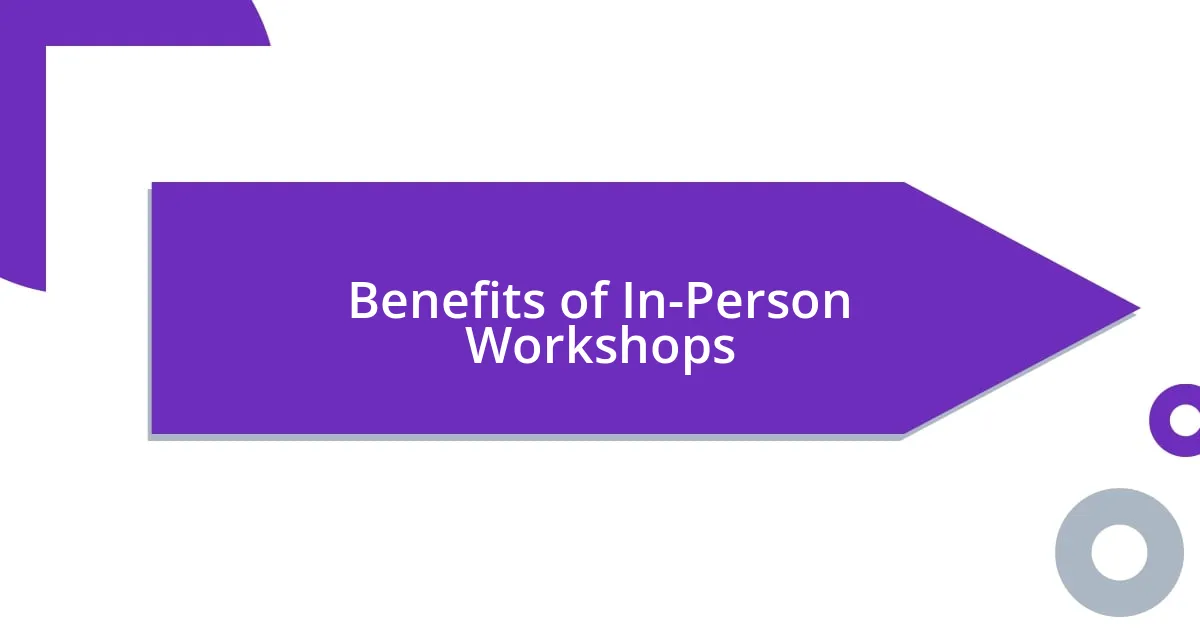
Benefits of In-Person Workshops
In-person workshops create an immersive environment that often enhances learning outcomes. I vividly remember a time when we broke out into small groups in a workshop, and the energy skyrocketed as we shared ideas and built on one another’s thoughts. That tactile experience of collaboration is something I believe is integral to deep learning; it allows for immediate feedback and connection that simply isn’t replicated through a screen.
Moreover, the physical presence of instructors and peers can dramatically boost motivation and accountability. I’ve found that seeing someone’s passion up close—whether it’s the workshop leader passionately explaining a concept or colleagues excitedly discussing ideas—sparks a connection that fuels my desire to engage actively. There’s something incredibly inspiring about that atmosphere which compels participants to take their learning journey seriously and eagerly.
Additionally, in-person workshops offer opportunities for valuable networking. After an inspiring session, I remember lingering over coffee, engaging in real conversations that blossomed into collaborations. Those face-to-face interactions can lead to meaningful professional relationships that often don’t develop in online settings. Connecting in a shared physical space tends to create stronger bonds, offering not just knowledge but a rich community experience.
| Benefits of In-Person Workshops | Description |
|---|---|
| Enhanced Engagement | Participants are more likely to be actively involved, leading to richer discussions. |
| Immediate Feedback | Physical presence allows for real-time questions and clarifications. |
| Stronger Networking Opportunities | Face-to-face interactions foster meaningful professional connections. |
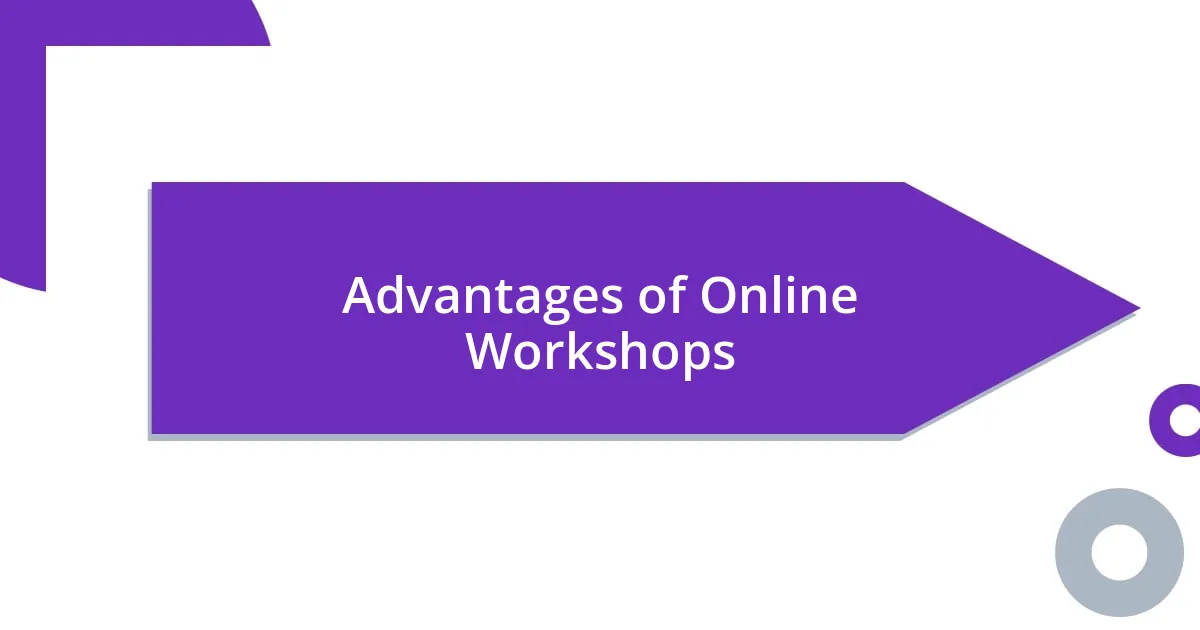
Advantages of Online Workshops
Online workshops really shine in terms of accessibility, allowing anyone with an internet connection to join from the comfort of their home. I remember participating in a workshop focused on digital marketing strategies while sipping my morning coffee—pure bliss! This format opened doors for me to connect with experts and peers from around the globe, enriching the learning experience in ways I hadn’t expected.
Here are some key advantages of online workshops:
- Flexibility in Scheduling: Participants can join from anywhere, making it easier to fit learning into busy lives.
- Diverse Perspectives: Engaging with attendees from different backgrounds brings in a variety of insights that enhance discussions.
- Cost-Effectiveness: Without travel costs or venue fees, attending workshops online is often more budget-friendly.
- Access to Recorded Sessions: Most online workshops provide recordings, allowing participants to revisit content whenever needed.
- Comfortable Environment: Learning in a familiar space can reduce anxiety, making it easier to absorb new information.
It’s fascinating how technology enables us to break geographical barriers. I once attended a virtual workshop where we discussed cultural marketing strategies, and hearing insights from a participant in another country not only broadened my understanding but also sparked a genuine sense of community. It reminded me that learning doesn’t have to be confined to a physical space; the world’s best ideas can flourish from anywhere we choose to connect.
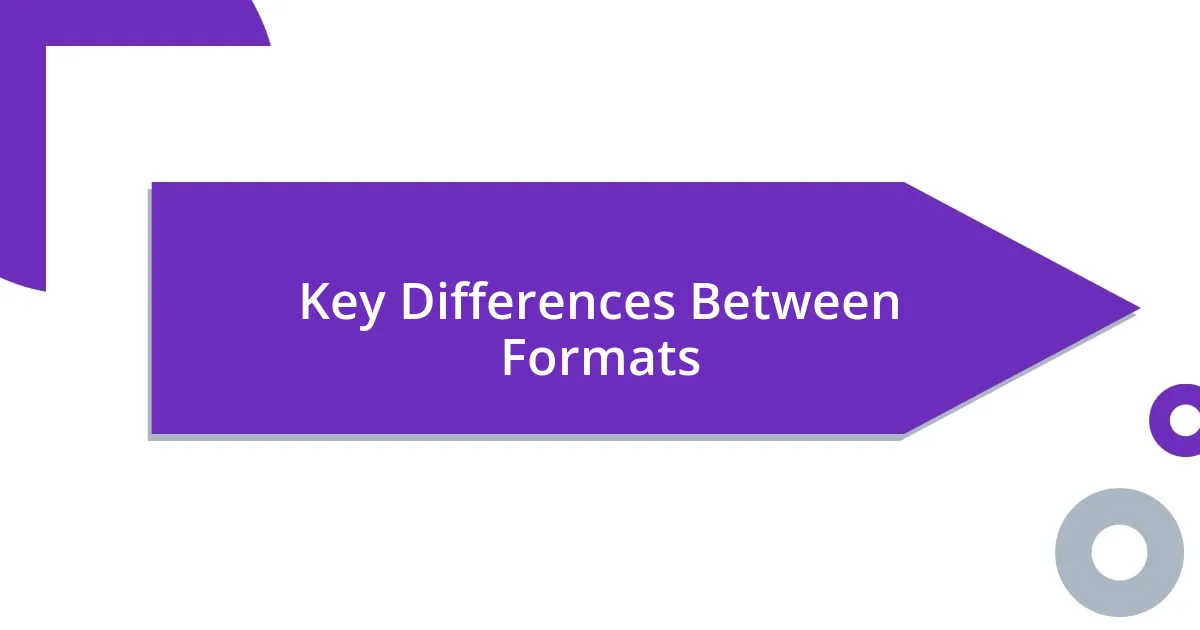
Key Differences Between Formats
When comparing in-person and online workshops, the interaction dynamics stand out. I find that in-person settings create a palpable energy that simply can’t be replicated online. Think about it—how many times have you left a workshop buzzing with excitement after an engaging discussion? That immediate feedback from peers and instructors often leads to lightbulb moments that contribute to deeper learning.
On the flip side, the convenience of online workshops means participants can engage from virtually anywhere. I recall sitting at my kitchen table, completely immersed in a virtual workshop on personal development. This comfort allowed me to focus more intently. It’s interesting to note that this format also removes some of the pressure that can come with in-person events; there’s less anxiety about how one looks or what to wear. Yet, does this comfort enhance focus, or does it lead to distraction? In my experience, it really depends on the individual.
Moreover, access to diverse perspectives is a clear distinction. I once joined a webinar where participants shared their unique experiences from various parts of the world. This brought a rich tapestry of viewpoints that broadened my understanding of global issues. In-person workshops may excel in creating lasting interpersonal connections, but online formats undeniably break down barriers and foster global collaboration. Balancing these elements is key to making the most of each format.
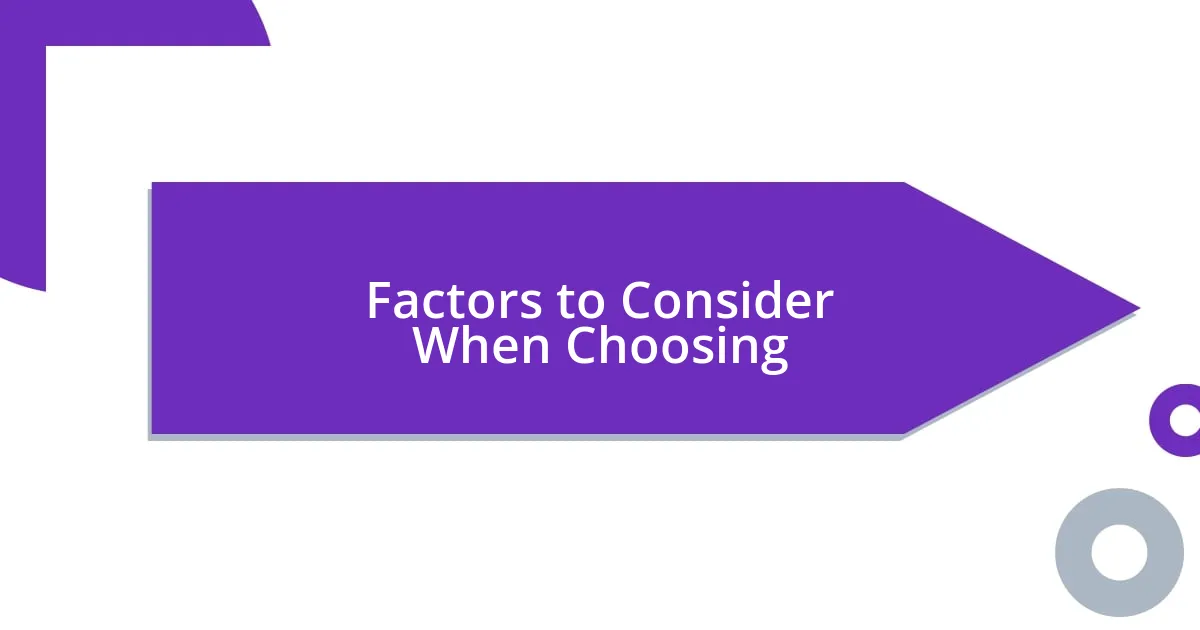
Factors to Consider When Choosing
When deciding between online and in-person workshops, one crucial factor to reflect on is your preferred learning style. Personally, I’ve noticed that I thrive in interactive environments—there’s something about the energy of a room filled with eager learners that just lights a fire under me. Have you ever felt that surge of motivation from a lively group discussion? It’s a feeling hard to replicate through a screen. Yet, some people might prefer the freedom that online workshops offer, where they’re able to learn at their own pace and revisit materials as needed.
Another aspect to consider is the networking opportunities each format presents. I vividly remember making a valuable connection during a face-to-face workshop a few years back. We shared insights and exchanged contact information over coffee, leading to a collaboration that opened new doors for both of us. In my experience, those spontaneous conversations often lead to memorable partnerships and friendships. But online platforms can also offer rich networking possibilities; I’ve engaged in high-quality discussions in breakout rooms, though it’s different—from my couch rather than a coffee shop vibe. What does networking look like for you?
Lastly, assess your comfort level with technology. Online workshops can sometimes be daunting if you’re not tech-savvy. I once attended a virtual event where a technical hiccup left me fumbling to silence my microphone mid-sentence—definitely not my finest moment! If technology isn’t your strong suit, in-person workshops might provide a more straightforward experience. However, I’ve also seen many attendees blossom with online platforms, embracing new tools and techniques they never thought they could manage. Where do you see yourself fitting into this digital landscape?
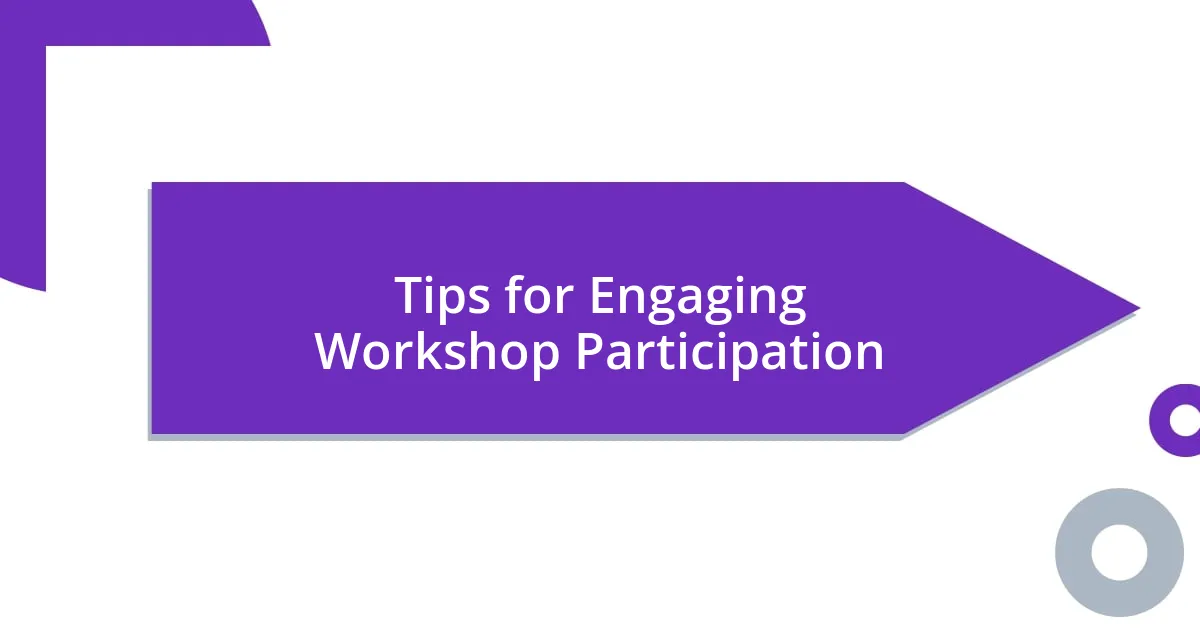
Tips for Engaging Workshop Participation
Engaging workshop participation can often hinge on asking questions. I’ve found that prompting my fellow participants to share their thoughts not only lights up the discussion but also deepens everyone’s understanding. For instance, during a workshop focused on creative storytelling, I asked, “What’s a pivotal moment in your own life that shaped your narrative style?” This simple question led to an inspiring exchange that bonded us as a group.
In both online and in-person settings, utilizing interactive tools can significantly enhance participation. I remember attending a hybrid workshop where we used live polling to gauge reactions in real time. It was exhilarating to see everyone’s responses displayed instantly—it transformed the atmosphere and kept us all engaged. Have you had a similar experience with interactive components? If so, wouldn’t you agree that it elevates the learning experience?
Another effective tip is to embrace small group discussions. I once joined a sphere of creatives during an online workshop, and breaking into smaller groups made a huge difference. It felt much more personal, allowing us to converse openly while keeping the energy flowing. Have you considered how sharing ideas in a more intimate setting can feel less intimidating? It was eye-opening for me, revealing insights I might not have shared in a larger group.
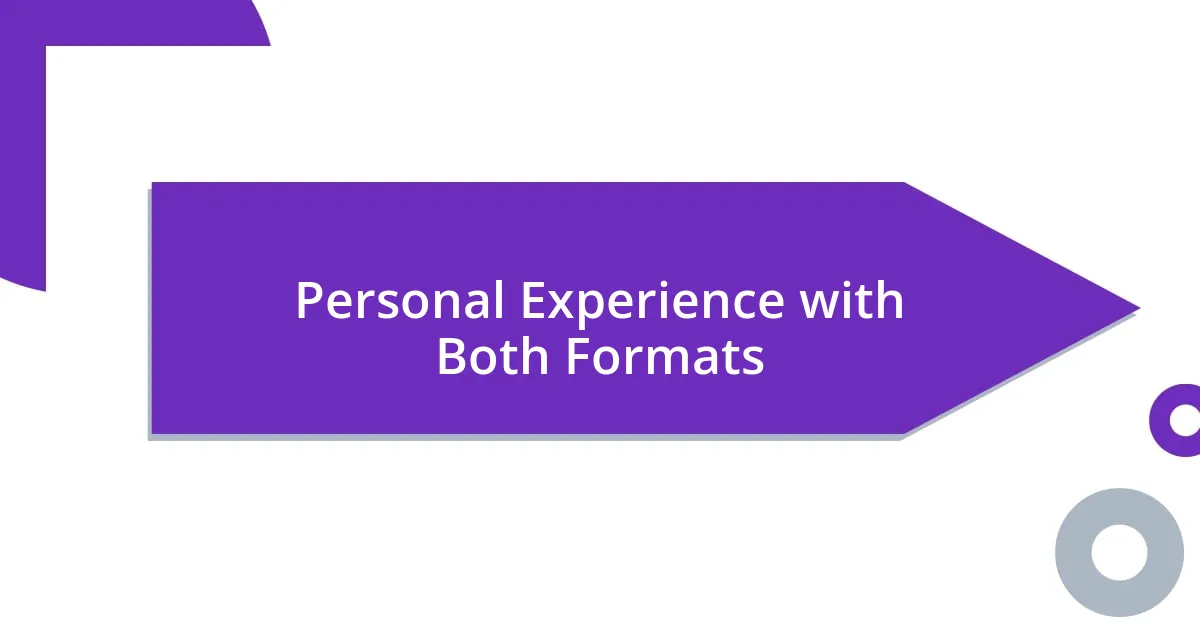
Personal Experience with Both Formats
I’ve had my share of both online and in-person workshops, and honestly, each format has left a distinct mark on my journey. One particular in-person session stands out; the dynamic group energy made even the most complex topics feel approachable. Remember that excitement when ideas bounce around a room? It’s contagious! I found myself more engaged in discussions, absorbing knowledge like a sponge, and building lasting relationships over shared experiences.
In contrast, I’ve also enjoyed the flexibility of online workshops. A memorable one was a deep-dive session on digital marketing strategies that I participated in from my cozy living room. I loved being able to take notes, pause the video to process concepts, and revisit sections later. It’s kind of freeing, isn’t it? Yet, I have to admit, while the convenience is great, sometimes I missed the face-to-face interactions that spark those unexpected insights. Virtual connections can feel a bit detached, making me long for those casual hallway chats that often lead to transformative ideas.
I’ll never forget an online workshop where the facilitator encouraged us to share our individual projects in breakout rooms. Initially, I felt a wave of anxiety, but as the conversation flowed, I realized how much I thrived on feedback from my peers. It was then that it struck me—whether in-person or online, the essence of meaningful connection and shared learning remains. I wonder, how do you feel when you share your work in a supportive environment, no matter the setting? That sense of community can truly amplify our growth, don’t you think?

